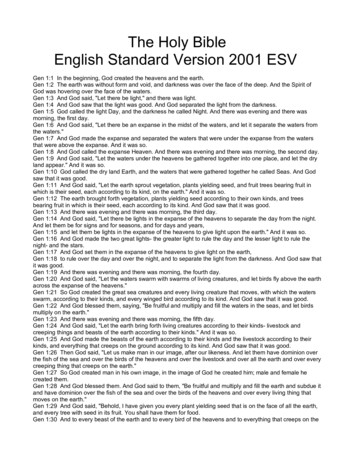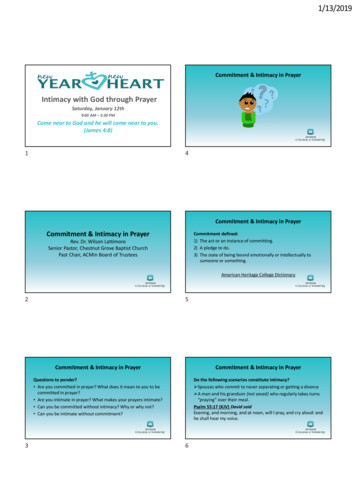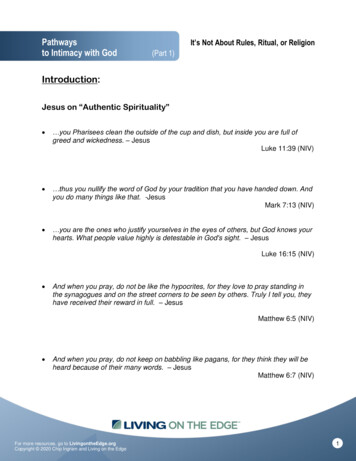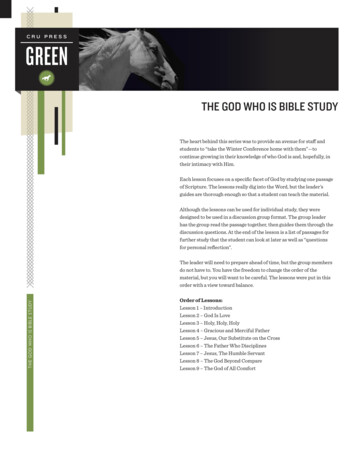
Transcription
English Standard VersionGodSearchesfor A HeartFully Hisi
PRECEPT UPON PRECEPT English Standard VersionKINGS AND PROPHETS SERIESCourse 2God Searches for a heart fully HisISBN 978-1-62119-085-1 2013 Precept Ministries International. All rights reserved.This material is published by and is the sole property of Precept MinistriesInternational of Chattanooga, Tennessee. No part of this publication may bereproduced, translated, or transmitted in any form or by any means, electronic ormechanical, including photocopying, recording, or any information storage andretrieval system, without permission in writing from the publisher.Precept, Precept Ministries International, Precept MinistriesInternational The Inductive Bible Study People,the Plumb Bob design, Precept Upon Precept, In & Out, Sweeter than Chocolate!,Cookies on the Lower Shelf, Precepts For Life, Precepts From God’s Word andTransform Student Ministries are trademarks of Precept Ministries International.Scripture taken from ESV Bible (The Holy Bible, English Standard Version ).Copyright 2001 by Crossway, a publishing ministry of Good News Publishers.Used by permission. All rights reserved.1st editionPrinted in the United States of Americaii
CONTENTSPAGEINTRODUCTION1Before You Begin We Want You to Know . . .3Important Information for First-timers5Important Note to Precept LeadersLESSONS7LESSON ONE: 1 Kings 15; 2 Chronicles 14–1622LESSON TWO: 1 Kings 15–1833LESSON THREE: 1 Kings 19–2145LESSON FOUR: 1 Kings 22; 2 Chronicles 17–1953LESSON FIVE: 2 Kings 1–2; 2 Chronicles 20–21:161Optional ReviewAPPENDIX70Explanation of the English Standard Version Bible Text Format711 Kings 15–2 Kings 2 Observation Worksheets1072 Chronicles 14–20 Observation Worksheets1251 Kings 15–22 at a Glance1272 Chronicles 14–20 at a Glance129Israel in the Days of Elijah131The Kings of Israel and Judah139Elijah’s Ministry141The Historical Chart of the Kings and Prophets of Israel and Judahiii
iv
HELPFUL STUDY TOOLSHELPFUL STUDY TOOLSARTHUR, KAY; ARTHUR, DAVID; DE LACY, PETEHow to Study Your BibleEugene, Oregon: Harvest House Publishers, 2010The New Inductive Study Bible—English Standard VersionEugene, Oregon: Harvest House Publishers, 2013Hebrew Word Study ToolsRECOMMENDED COMMENTARIESGAEBELIEN, FRANK E.The Expositor’s Bible Commentary, Volume 4Grand Rapids, Michigan: Zondervan Publishers, 1990SMITH, JAMES E.Old Testament Survey Series, The Books of HistoryJoplin, Missouri: College Press Publishing Company, 1995RECOMMENDED SOFTWARELogos Bible SoftwarePowerful search engines and up to 4,000 electronic Bible study resources(commentaries, lexicons, Bible dictionaries etc.) make it fast and easy to dosimple and complex searches of multiple sources, then pull materials togetherfor orderly presentation—excellent for word and topical studies based onEnglish or original Hebrew and Greek. Available at www.logos.com.v
vi
God Searches For a Heart Fully HisBefore You BeginBEFORE YOU BEGIN WE WANT YOU TO KNOW. . .We are so thrilled that you have chosen to study God Searches for a Heart Fully His, the secondof our ten courses in the Kings and Prophets Series. It will be such a blessing to your life becausethe Old Testament places a tremendous emphasis on the holy character and works of God thatanticipate fulfillment in the person of Christ in the New Testament. In essence, it lays thegroundwork for the only salvation possible—the salvation God provides in His Son “by whichwe must be saved.” The Bible is a progressive revelation—all sixty-six parts are essential tounderstanding the whole counsel of God.As you begin this series, it’s vital to understand the importance of a study like this and some ofthe differences between studying (primarily historical) Old Testament books and (primarilydoctrinal) New Testament epistles. In the Old Testament we come to know God—who He is and how He works in the affairs ofmankind—and we develop a godly fear of His awesome majesty, holy character, and works. The nation that is in the front and center of all God’s dealings is Israel. So as you studyKings and Chronicles, you find yourself immersed in Israel’s history, studying eventssurrounding the reigns of her kings in an effort to get the big picture—to understand howthese events affect her relationship to God and how God responds to His covenantpeople. It’s much like looking at the history of your country through the lives of itsleaders, what the times were like under each, the direction each led the country, and howeach impacted its future. As you observe the texts of Kings and Chronicles, remember observing history isdifferent from observing doctrine. If you’ve done New Testament Precept courses, you’llfind doing Observation Worksheets of historical books is much different from doing oneon a doctrinal epistle. You don’t want to get bogged down with details; rather, you wantto get a general understanding of the times and God’s dealings. Also, your focus on keywords will not be as strong as when you’re observing doctrine. It’s not important to remember every detail of a king’s life as long as you understand theessence of it—how lessons from his life and leadership can apply to your life and walkwith the Lord. If you study the entire series (we pray that you will), you will also hear and understandGod’s message to His people through the voices of His prophets during those times. According to 1 Corinthians 10:11 and Romans 15:4, what God chose to preserve in theOld Testament is for our example and instruction, “on whom the end of the ages hascome” (1 Corinthians 10:11). The application, the encouragement, and the hope fromthese historical studies are distinctive. 2013 Precept Ministries International1
2 2013 Precept Ministries International
God Searches For a Heart Fully HisInformation for First-timersIMPORTANT INFORMATION FOR FIRST-TIMERSWelcome to Precept Upon Precept Inductive Bible studies. We’re excited that you’ll be studyingwith us! Inductive Bible study draws you into personal interaction with God through His Wordso that your beliefs are based on a prayerful observation and understanding of the Scriptures—truth that will transform your life. Studying this way is summed up in the words of the psalmist:“for You Yourself have taught me” (Psalm 119:102). May the Lord bless you richly as you delveinto the treasures of His Word.The following will be helpful to you as you begin your studies:OBSERVING THE TEXTIn the lessons that follow, you’ll be asked to mark key words or phrases on a particular passageusing Observation Worksheets. Key words or phrases unlock your understanding of the text. Marking them distinctivelywith colors or symbols helps you quickly locate the word or phrase, see how it’s used andhow often.It’s advantageous to keep markings simple; colors and color combinations are easiestleast cluttering.You’ll find suggestions on the back cover of your Precept book; however, colors andsymbols are your choice.When you have several words or phrases to mark, it’s helpful to read the chapter morethan once, marking a couple of words each time.It’s also helpful to make a bookmark (e.g., an index card) and list all the key words,marking them the way you want to mark them in the text.FILLING IN THE AT A GLANCE CHARTAs you finish observing a chapter, you’ll be asked to record its theme (main subject) on an At aGlance chart specifically designed for the book you’re studying. This chart provides space to listeach chapter’s theme and places for recording other pertinent information on the book. Whencompleted, this chart provides a synopsis of the book at a glance.We have three sources that will show you how to do the above and more (all available atwww.precept.org or by calling 800-763-8280):How to Study Your Bible: Chapter 2, “Getting the Big Picture.”The New Inductive Study Bible (NISB). See “How to Use the Inductive Study Approach” and“A System for Marking Key Words . . . Throughout Your Bible.”Discover the Bible for Yourself by Kay Arthur, “Observation.” 2013 Precept Ministries International3
God Searches For a Heart Fully HisInformation for First-timersWORD STUDIESYou’ll find out how to do word studies by reading the chapter, “It’s All Greek to Me,” inHow to Study Your Bible.There are many helpful computer programs. We highly recommend Logos BibleSoftware’s wide range of products.We’re so thankful you’ve joined us. You’re about to join hundreds of thousands in an excitingadventure that will help you discover truth for yourself in a way you’ve never done before. Yourlife will be transformed and strengthened through the Word of God.However, we want you to remember that it takes time and practice to make these study skills“second nature.” And it does not come without spiritual warfare. The only offensive weapon thechild of God has is the sword of the Spirit, the Word of God. You need to sharpen this sword andnot let anyone or anything discourage you. Precept is not difficult; it simply takes time anddiscipline, but that’s what discipleship is about!QUESTIONSIf you have any questions, call your Precept Leader for help. We are sure he/she will help you orconnect you with another student who can. We also want to urge you to take our trainingworkshops. They will teach you basic inductive study skills and give you an opportunity topractice them. There are also workshops to help prepare you to lead Precept should God sodirect. You can find out more about the training workshops by going online to www.precept.org.Blessings, Beloved. Welcome to the Precept family.Remember, you too can say with the psalmist, “I do not turn aside from your rules, for you havetaught me.”4 2013 Precept Ministries International
God Searches For a Heart Fully HisImportant Note to Precept LeadersIMPORTANT NOTE TO PRECEPT LEADERSWe have included “The Who’s Who Optional Review” after the last lesson for you and yourstudents to aid in reviewing the kings and prophets studied in this course.Here are some suggestions of how this optional assignment can be used: In scheduling this course, plan an extra week at the end and have your students complete theoptional assignment for that week. You can encourage them to be creative by preparing asong, poem, skit, etc. and/or sharing some of their completed sketches. This is a great way toreview the kings of Israel and Judah and some of the main events of their reign. Allow timefor students to tell how God spoke to them through His Word in this course. You may alsohave a time of fellowship with snacks or a luncheon. If you’re completing this course and then breaking for the summer, you can assign studentsto complete the optional assignment during the break. Use letters, phone calls, or emails toremind them to review what they’ve done before your first meeting in the fall. At your firstmeeting, briefly review the kings to help new students understand the context. Let studentsshow some of their sketches. Then help all students get started on their first lesson, makingsure the new ones know how to do the assignments. 2013 Precept Ministries International5
6 2013 Precept Ministries International
Precept Ministries InternationalP.O. Box 182218Chattanooga, TN 37422God Searches For a Heart Fully HisLesson 1, 1 Kings 15, 2 Chronicles 14–16LESSON ONE1 Kings 15; 2 Chronicles 14–16THIS LESSON The following located in the AppendixINCORPORATESObservation Worksheet of 1 Kings 15Israel in the Days of ElijahObservation Worksheets of 2 Chronicles 14–16“2 Chronicles 14–20 at a Glance”“The Kings of Israel and Judah”Cross-referencesGod found David, a man after His heart, but His search was not over. One isnot enough. The kingdom of God marches on—advances—on the strength ofmen and women whose hearts are blameless toward Him. A careful study ofchurch history affirms over and over the power of individuals fullycommitted to serving God’s purpose in their generations. How they areneeded in our generation!This is why, Beloved, each of us needs to come to the point where weconsciously choose to serve the Lord.To whom will you give your heart? Whose purpose will you serve?It is our prayer that what you learn over the next five weeks will so captureyour heart that it will impact the course of the kingdom of God in waysbeyond what you can imagine.DAYONEIf this is your first course with us in this Kings and Prophets series, you can get anoverview of where we are historically by looking at the chart, “Israel’s Division andCaptivity” at the end of this lesson. At this point in Israel’s history the twelvetribes of Israel have divided into two kingdoms (ten tribes in the North and twotribes in the South) that conflict not only with their enemies but also unfortunatelywith each other.The war between the first kings of the divided kingdom, Rehoboam andJeroboam, didn’t end with Rehoboam’ death. When his son Abijam (or Abijah, ashe is called in Chronicles) took the throne of Rehoboam, it was “like father, like 2013 Precept Ministries International7
God Searches For a Heart Fully HisLesson 1, 1 Kings 15, 2 Chronicles 14–16son.” Abijam followed his father’s footsteps in the path of evil, in the course ofhis war with Jeroboam. Fortunately he reigned only three years. Asa his sonsucceeded him. This is where our study begins—a study, once again, that willespecially benefit you if you long to be a man or woman of God.1. Observe 1 Kings 15:1-24, which you will find in the Appendix of thisworkbook. You’ll want to read these verses at least twice as you do yourobservations. Since you are studying the very words of God preserved foryour spiritual understanding and godliness, you’ll want to begin with prayer,asking for the assistance of the blessed Holy Spirit. Remember, if you are achild of God, the Spirit of God lives in you as your resident tutor! Take fulladvantage of His presence.If you are a first-timer with Precept, we want to welcome you. For a specialmessage and for help in completing your assignments, read the section forFirst-timers at the front of this book.As you observe this chapter:a. Develop a system for marking the kings of Israel and the kings of Judah sothey are easily distinguished. Use either colors and/or symbols. Thesimpler the symbols the easier it will be unless you have a lot of time todevote to this. Some of you may choose to mark your Bibles instead of theObservation Worksheets.b. It will help you to make a Key Word Bookmark. You can cut out the oneon the back cover of your workbook. On the blank side, write key wordsyou are going to mark and color-code and/or put symbols over the words.The other side gives suggested markings for words used frequently in theBible. In this study, those words are indicated with an asterisk [*].c. You will notice a key (repeated) phrase as you study the reigns of thekings—either they did right in the sight of the Lord or did what was evil.Mark these in a distinguishable way.d. People are key players in historical accounts so give them carefulattention. Note who they are and what the text tells you about them. Theirbehavior and speech will reflect their character. (This says a lot, doesn’t it!And what do our character and speech reflect?)e. Mark references to time*—which are most important. (Many of us use agreen clock.) Time answers one of those 5 Ws and H questions that are8 2013 Precept Ministries International
God Searches For a Heart Fully HisLesson 1, 1 Kings 15, 2 Chronicles 14–16key to observing the text: who, what, when, where, why and how. Notewhen a king began his reign and how long he reigned.f. Geographical locations* are important because they tell us the allimportant “where.”If you are not familiar with the geography of a region, see if you can findplaces you mark on the map “Israel in the Days of Elijah” located in theAppendix.g. The heart is very important. It’s the control (command) center of our lives.It’s the seat of our thinking and our driving passions. Therefore markreferences to the heart. Note what you learn.h. Also mark three other things in this chapter: sin,* death or dying (seedie*), and the house of the Lord (see tabernacle*). The house of the Lordwas central to all life. It was the place of worship, sacrifice, andcelebration. You’ll want to observe what’s happening in and around thehouse of the Lord.i. When you finish observing the chapter, it will help to summarize thecentral event of the chapter in as few words as possible. Write it down onthe At a Glance charts in the Appendix under the heading Chapter Theme.There is a chart for 1 Kings and another for 2 Chronicles. Because there ismore to observe in 1 Kings 15, we won’t give this chapter a theme untilnext week.2. When you observed the text, you saw references to Jeroboam, such as inverse 6: “Now there was war between Rehoboam and Jeroboam all the days ofhis life.” As you proceed through Kings, you will see many references toJeroboam, the first king of the Northern Kingdom. The ten northern tribes ofIsrael came under his leadership after Solomon died and his son Rehoboambecame king. If you are not familiar with this, you need to go back and read1 Kings 11:26–12:33. This will help you see why God uses Jeroboam as anexample. 2013 Precept Ministries International9
God Searches For a Heart Fully HisLesson 1, 1 Kings 15, 2 Chronicles 14–163. Now go back and walk through 1 Kings 15:1-24 again. Look at the key wordsand phrases you marked and think about what you learn from marking thosewords. As you move through the text, looking at every occurrence of sin forexample, see if it answers any of the 5 Ws and H. This will help youunderstand the content of the chapter better and learn what you can aboutGod, kings, prophets (if they’re mentioned), people, and events.4. Finally, list kings that are mentioned in this chapter. Put down whom they ruleover, how long they rule, and what you learn from the text about each one.Good start. Aren’t you awed at what you saw all by yourself just by observing thetext? This, fellow student, is the joy and reward of inductive study.DAYTWOYesterday you met Asa, one of several kings mentioned in 1 Kings 15. By verse24 Asa was buried with his fathers in the city of David (Jerusalem). Is this all theWord of God tells us of a man whose heart was wholly true to the Lord? No!Second Chronicles has much to say about Asa, and you are going to be sothankful because there is much more to be learned from his life for our own.1. As you begin your study in prayer, ask God to use Asa’s example to correctand encourage you according to where you are in your life and where youwant to be! Although you may not know, rest assured our omniscient Godknows, because there is nothing hidden from His sight. Ask Him to revealthings that hinder or distract you from being a man or woman after God’s ownheart.10 2013 Precept Ministries International
God Searches For a Heart Fully HisLesson 1, 1 Kings 15, 2 Chronicles 14–16Your assignment for today is to observe 2 Chronicles 14. Again, read theverses at least twice when you do your observations. Mark the text using yourkey word bookmark after you add the following words and phrases to it:a. seeking the Lordb. the LORD*—Because the Lord God is mentioned quite often in the text, wedon’t usually recommend that you always mark Lord or God as it canclutter the text too much. However, if there is something new you discoverabout God or His ways, then it is good to mark that reference and make anote of what you learn in the margin of your Bible or worksheet. This isthe way you develop a biblical systematic theology on the person andways of God.c. geographical locations (look them up on the map “Israel in the Days ofElijah”).2. Now before you go any further, list the main characters and events of thischapter. What’s happening and who’s involved?3. What do you learn from this chapter about Asa’s relationship with God? 2013 Precept Ministries International11
God Searches For a Heart Fully HisLesson 1, 1 Kings 15, 2 Chronicles 14–164. Did you notice the “so” of verse 12? Where do you run in the time of need,Beloved? On what or whom do you depend? Is the Lord your very presenthelp in the time of trouble? Do you give Him an opportunity or are you afraidto trust Him? Be honest in your answers. It’s always good to ask God tosearch your heart as the psalmist does in Psalm 139.DAYTHREEThere are still two chapters in Chronicles that deal with Asa. The Chroniclerwanted to preserve some important truths for the struggling remnant that returnedto rebuild the temple and reestablish the nation of Israel. Obviously these chapterswere important not only for them in their period of history but also for succeedinggenerations as well. They contain precepts of life vital for every generation thatawaits the kingdom of God on earth.1. Observe 2 Chronicles 15. As you mark the text:a. Mark courage. You will see this term intermittently in the Old Testamentso it’s always good to mark. Make it stand out and begin here if you havenot marked it previously. If you studied Joshua with us, you marked it inthe very first chapter. We suggest you do it throughout your Bible.b. Mark covenant* and its synonym oath. This is another word you alwayswant to mark. A covenant is a solemn binding agreement. Because it is anoath, the parties are obligated to carry out the terms. God, the sovereignadministrator of all covenants, judges those who break these covenants.c. Watch and mark references to time since they are important and will helpkeep you in context.By the way, do you know how much we appreciate you? Thank you fordetermining to discipline yourself in the study of God’s Word so that you can beall God would have you be!12 2013 Precept Ministries International
God Searches For a Heart Fully HisLesson 1, 1 Kings 15, 2 Chronicles 14–162. In 2 Chronicles 15:1-7 you meet a prophet of God with a message for a king.Look carefully at his message and note what the message is, why it is given,and when. List your insights. Be thorough in your answer.3. Read the rest of 2 Chronicles 15 again. When Asa took courage and acted,what did he do? List the actions and what you learn from them.4. How did the Lord respond to all this? Write your insights.5. Now by way of review, list what you learn from marking references tocovenant and oath. 2013 Precept Ministries International13
God Searches For a Heart Fully HisLesson 1, 1 Kings 15, 2 Chronicles 14–166. If you didn’t get it down or think it through, what did you learn fromreferences to the heart? How does yours measure up?7. Is there anything going on in your world that you need to be courageous aboutand act on? Anything God is nudging you about? Take a few minutes andthink on the purpose of your life in light of His kingdom. Then write downyour insights. If none come to you, Beloved, continue to pray. Remember thekingdom of God is about people being reached with the Gospel and discipledto be consecrated followers of Jesus Christ. Every incident of life is to be seenas a platform for the furtherance of God’s kingdom. Paul makes this clear inPhilippians 1 when he tells how his imprisonment in Rome because of theGospel turned out for the furtherance of the Gospel. Life may be hard, fraughtwith difficulties and disappointments, but nothing is without purpose whenyou are His!8. Finally, how long did all these events take? Was Asa’s “success”instantaneous, or delayed? Is there a principle for us to live by? In our instantgratification generation, we want everything now. Why do some things takelonger than others? It’s kind of like growing up; it takes time. There is noinstant maturity, no instant sanctification. This process God takes us throughslowly, giving us a little at a time, letting us grow in experience. Don’t growimpatient, Beloved—just grow!14 2013 Precept Ministries International
God Searches For a Heart Fully HisLesson 1, 1 Kings 15, 2 Chronicles 14–16Well, Beloved, you are off to a good start. It’s awesome, isn’t it, to study the OldTestament! There is so much to learn from the lives of these kings and the peoplethey ruled over. So much to learn about God. Daniel 11:32b tells us that thepeople who know their God stand firm and are able to take action. That is goingto be you, Beloved, if it’s not already! Press on, faithful one. God has a verysignificant purpose for your life.DAYFOUR1. Today we move into the final chapter on Asa, 2 Chronicles 16. Observe thetext. Don’t forget to mark references to time. It will help you follow whathappens during his reign of forty-one years—a reign covered in four chaptersin the Bible, one in Kings and three in Chronicles.2. Now let’s analyze Asa’s reign according to the events recorded by the Spiritof God in the Bible. Review what 1 Kings 15 tells you about Asa, and thensort out the events in light of 2 Chronicles 14–16. Using a separate sheet ofpaper, list the events of these four chapters chronologically. If the text tellsyou when the event happened with respect to the year of Asa’s reign, record itnext to the event. Leave extra space between the events as you list them,because in Lesson 2 we will ask you to merge events from other passageswhere they fit chronologically. If you prefer, you may do this assignment inthe form of a time line.3. How did this chapter hit you, Beloved? Did it evoke any emotions? How didyou feel when you read 2 Chronicles 16 and why?4. God does nothing, says nothing, records nothing in His Book without apurpose. Read 1 Corinthians 10:11 and Romans 15:4. What do you thinkGod’s purpose is for including this account of Asa in His holy Book? Thinkabout it and then thoughtfully write your answer. You don’t want to miss thelesson(s) God preserves for our generation. 2013 Precept Ministries International15
God Searches For a Heart Fully HisLesson 1, 1 Kings 15, 2 Chronicles 14–165. Finally, let’s do some application from Asa’s life.a. Do you see similarities in your own life—success in trusting God in somecircumstances, then failure in others; confidence at one point, doubt atanother? If so, what do you need to watch in situations like this and why?b. Do you think Asa had to end up the way he did or could he have returnedto God? When you write your answer, give a reason for it.DAYFIVEGod searches for hearts that are blameless toward Him—this is His message, readwith your own eyes in 2 Chronicles 16:9a. Why the heart? This is what we wantto explore, faithful student, on this final day of study for this week.1. Let’s begin today with a quick review. In the Appendix of this workbook youwill find the chart, “The Kings of Israel and Judah.”a. Fill this out as you study the kings and it will help you remember whothey are. Give a brief description of each king, including how long hereigned and what he was like. Color the heart to the left of each king’sname, using one color for the kings whose hearts were devoted to the Lordand another color for those whose hearts were not.b. You’ll note that there is a column for the prophets to Israel and to Judahon the chart. Review 2 Chronicles 15:1-7 and 2 Chronicles 16:7-10. On“The Kings of Israel and Judah” chart, find each prophet mentioned andrecord a brief summary of his message.16 2013 Precept Ministries International
God Searches For a Heart Fully HisLesson 1, 1 Kings 15, 2 Chronicles 14–16c. There is also a column on the chart for nations who were enemies of Israeland/or Judah. Review 2 Chronicles 14:9-15 and also 2 Chronicles 16:1-4along with its parallel passage 1 Kings 15:16-20. In the middle column ofthe chart, fill in each name of a nation who was an enemy and draw anarrow toward the king or kings the nation came against. The first one isdone for you.2. Now let’s go to David, where the phrase “a man after God’s own heart” finds itsconception. Read 1 Samuel 13:14. If you didn’t study 1 Samuel with us, thenmark the reference to the heart in this verse. You might want to do it with a redheart shaded yellow. That’s the way some of us do it when it’s a reference toGod’s heart! If you are unfamiliar with the setting of this verse, then read thefirst thirteen verses of this chapter. Saul is king. In 1 Samuel 10 Samuel anointsSaul to be king and then tells him in verse 8 to wait seven days for him to come,offer burnt offerings, and tell Saul what to do. Now with that in mind, what doyou learn about the kind of “heart” God is looking for?3. Now let’s jump to 1 Samuel 16 where we find God finding “His” man. Read1 Samuel 16:1-13. Mark heart and record what you learn from the text aboutGod and a person’s heart.4. What was said about David’s heart after he died? Look up the followingverses, note what is said, and when.a. 1 Kings 9:1-5 2013 Precept Ministries International17
God Searches For a Heart Fully HisLesson 1, 1 Kings 15, 2 Chronicles 14–16b. 1 Kings 14:7-8c. 1 Kings 15:1-5d. Acts 13:225. What does the Word of God teach us about the heart? Although the Word ofGod does not define “heart” like a dictionary, its meaning can be discoveredinductively by the way it’s used in texts of Scripture. Look up the followingpassages in your Bible, watching for and marking heart. See if the text givesyou clues to the meaning of heart. Record your insights of what happens in aheart next to the verse.a. Genesis 6:5-6; 8:21b. Deuteronomy 10:10-1618 2013 Precept Ministries International
God Searches For a Heart Fully HisLesson 1, 1 Kings 15, 2 Chronicles 14–16c. Deuteronomy 30:1-20d. Proverbs 4:20-23e. Matthew 12:33-37f. Matthew 15:18-19g. 1 Kings 11:2-4, 9h. 1 Chronicles 28:9 2013 Precept Ministries International19
God Searches For a Heart Fully HisLesson 1, 1 Kings 15, 2 Chronicles 14–16i. Read Mark 12:28-34. What do you learn about the importance of the heartfrom these verses?6. Now, Beloved, from all you have explored in the Word, what is the heart the“seat of” in a person? If a person’s heart could be likened to a commandcenter, what does it command? What happens in a person’s h
70 Explanation of the English Standard Version Bible Text Format 71 1 Kings 15–2 Kings 2 Observation Worksheets 107 2 Chronicles 14–20 Observation Worksheets 125 1 Kings 15–22 at a Glance 127 2 Chronicles 14–20 at a Glance 129 Israel in the Days of Elija










